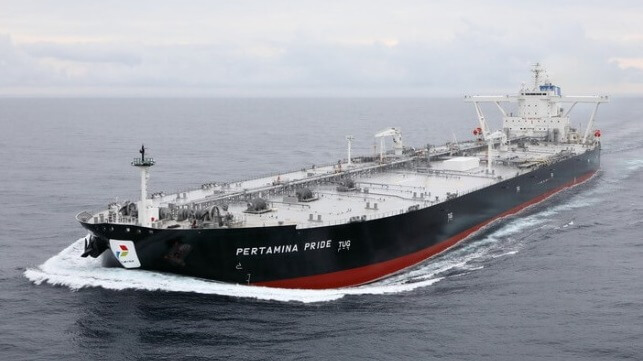The Maritime Executive
The shipping division of Indonesia’s state-owned energy company Pertamina is planning an accelerated investment program designed to modernize its fleet and expand its capabilities. Detailing its future business strategy to reporters, Pertamina International Shipping doubled its projected investments to $3 billion over the next five years as its moves to also expand its business into new forms of energy and to prepare for the transition in the shipping industry to green energy.
Pertamina International Shipping (PIS) today reports it owns a fleet of 11 vessels, mostly midrange tankers. The company operates two newly built 301,000 dwt VLCCs delivered at the beginning of 2021, as well as two large gas carriers, but most of its ships are older, dating from between 2004 and 2011. They also own a vessel that dates to 1985 that was converted in 2012 to an FSO, while the remainder of the ships are under time charters. In May 2022, they acquired a 50,000 dwt MR chemical tanker built in 2013, which was renamed the PIS Precious.
“We will invest big in replacing vessels,” Wisnu Santoso, a director at Pertamina International Shipping said detailing the company’s business plans. He highlighted plans to invest up to $3 billion by 2027 to rejuvenate and expand the company’s fleet. “We want to reduce the average age of our fleet within the next five years to 15 years from currently at around 20 years.”
Noting that shipyards currently have long waits for newbuilds he did not rule out the acquisition of existing ships. As part of the efforts, he also outlined efforts to enter the liquified natural gas market saying they were targeting their first acquisition of a dedicated LNG carrier. PIS has also entered into a collaboration with Japan’s NYK to develop an LNG logistics operation.
At the end of 2021, PIS announced its initial investment plan calling for spending $1.5 to $1.6 billion by 2030 on the transition of its operations. CEO of Pertamina International Shipping, Erry Widiastono said the investment needs were in line with national and global energy needs, emphasizing environmental factors and energy transition.
“PIS will anticipate future developments in the direction of the shipping business, on greener vessels. For example, ships for transporting gas such as LPG, LNG, and others,” said Erry in December 2021. “Later, we will also see further developments in the renewable energy sector.”
In addition to the energy transportation business, Erry noted the strong opportunities for shipping other commodities. PIS has a shipping business for non-energy commodities which it looks to expand in the future.
The efforts to expand the state-owned shipping company are similar to other emerging economies which have called for growth in national shipping operations. Vietnam outlined an ambitious plan for investments in its national fleet while both Thailand and South Africa have detailed their effort for the launch of national shipping companies.
